

Websites. Google - Products. Home. The free encyclopedia. Computers and computing. Arduino - HomePage. Linux. Linux ( History[edit] Antecedents[edit] With AT&T being required to license the operating system's source code to anyone who asked (due to an earlier antitrust case forbidding them from entering the computer business),[23] Unix grew quickly and became widely adopted by academic institutions and businesses.
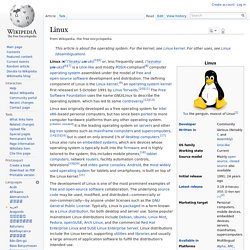
In 1984, AT&T divested itself of Bell Labs. Free of the legal obligation requiring free licensing, Bell Labs began selling Unix as a proprietary product. Linus Torvalds has said that if the GNU kernel had been available at the time (1991), he would not have decided to write his own.[26] Personal computer. A personal computer (PC) is a general-purpose computer, whose size, capabilities and original sale price makes it useful for individuals, and which is intended to be operated directly by an end-user with no intervening computer operator.
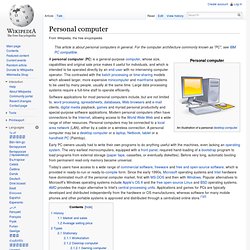
This contrasted with the batch processing or time-sharing models which allowed larger, more expensive minicomputer and mainframe systems to be used by many people, usually at the same time. Large data processing systems require a full-time staff to operate efficiently. An ARM GNU/Linux box for $25. Take a byte! Charities, campaigns etc. The natural world.
Friends of the Earth: Home. Project GAP. Royal Botanic Gardens, Kew - Welcome To Our Website. Survival International - The movement for tribal peoples. WWF UK - Conservation, climate change, sustainability. Health. Action on Smoking and Health. Water and sanitation for all - UK site. Poverty and disaster relief. Disasters Emergency Committee. International Committee of the Red Cross. Leading UK charity fighting global poverty. Medical. Give Blood - do something amazing give Blood.
MÉDECINS SANS FRONTIÈRES - UK. Sightsavers - International Charity. People. David Attenborough. Dian Fossey. Dian Fossey (/daɪˈæn ˈfɒsi/; January 16, 1932 – c.
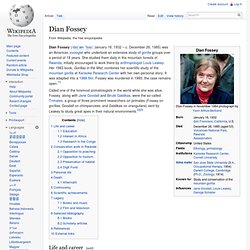
December 26, 1985) was an American zoologist who undertook an extensive study of gorilla groups over a period of 18 years. She studied them daily in the mountain forests of Rwanda, initially encouraged to work there by anthropologist Louis Leakey. Her 1983 book, Gorillas in the Mist, combines her scientific study of the mountain gorilla at Karisoke Research Center with her own personal story. It was adapted into a 1988 film. Fossey was murdered in 1985; the case remains open.[1] Jane Goodall. Dame Jane Morris Goodall, DBE (born Valerie Jane Morris-Goodall on 3 April 1934)[2] is a British primatologist, ethologist, anthropologist, and UN Messenger of Peace.[3] Considered to be the world's foremost expert on chimpanzees, Goodall is best known for her 45-year study of social and family interactions of wild chimpanzees in Gombe Stream National Park, Tanzania.[4] She is the founder of the Jane Goodall Institute and the Roots & Shoots program, and she has worked extensively on conservation and animal welfare issues.
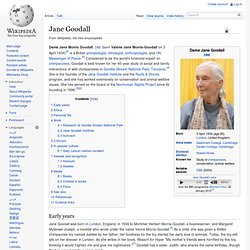
She has served on the board of the Nonhuman Rights Project since its founding in 1996.[5][6] Early years Jane Goodall was born in London, England, in 1934 to Mortimer Herbert Morris-Goodall, a businessman, and Margaret Myfanwe Joseph, a novelist who wrote under the name Vanne Morris-Goodall.[2] As a child, she was given a lifelike chimpanzee toy named Jubilee by her father; her fondness for the toy started her early love of animals. Africa Personal life Work Activism. Martin Luther King, Jr. Dr.
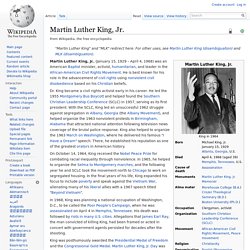
King became a civil rights activist early in his career. He led the 1955 Montgomery Bus Boycott and helped found the Southern Christian Leadership Conference (SCLC) in 1957, serving as its first president. With the SCLC, King led an unsuccessful 1962 struggle against segregation in Albany, Georgia (the Albany Movement), and helped organize the 1963 nonviolent protests in Birmingham, Alabama that attracted national attention following television news coverage of the brutal police response. King also helped to organize the 1963 March on Washington, where he delivered his famous "I Have a Dream" speech. Clive Sinclair. Sir Clive Marles Sinclair (born 30 July 1940) is an English entrepreneur and inventor, most commonly known for his work in consumer electronics in the late 1970s and early 1980s.
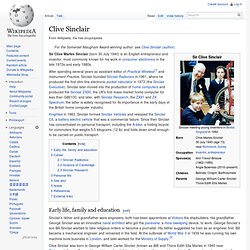
After spending several years as assistant editor of Practical Wireless[1] and Instrument Practice, Sinclair founded Sinclair Radionics in 1961, where he produced the first slim-line electronic pocket calculator in 1972 (the Sinclair Executive). Sinclair later moved into the production of home computers and produced the Sinclair ZX80, the UK's first mass-market home computer for less than GB£100, and later, with Sinclair Research, the ZX81 and ZX Spectrum; the latter is widely recognised for its importance in the early days of the British home computer industry. Knighted in 1983, Sinclair formed Sinclair Vehicles and released the Sinclair C5, a battery electric vehicle that was a commercial failure. Early life, family and education[edit] At an early age Sinclair designed a submarine. Career[edit] ZX Spectrum (1982) William Wilberforce. In 1787, he came into contact with Thomas Clarkson and a group of anti-slave-trade activists, including Granville Sharp, Hannah More and Charles Middleton.
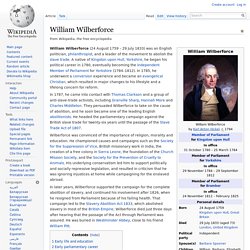
They persuaded Wilberforce to take on the cause of abolition, and he soon became one of the leading English abolitionists. He headed the parliamentary campaign against the British slave trade for twenty-six years until the passage of the Slave Trade Act of 1807.